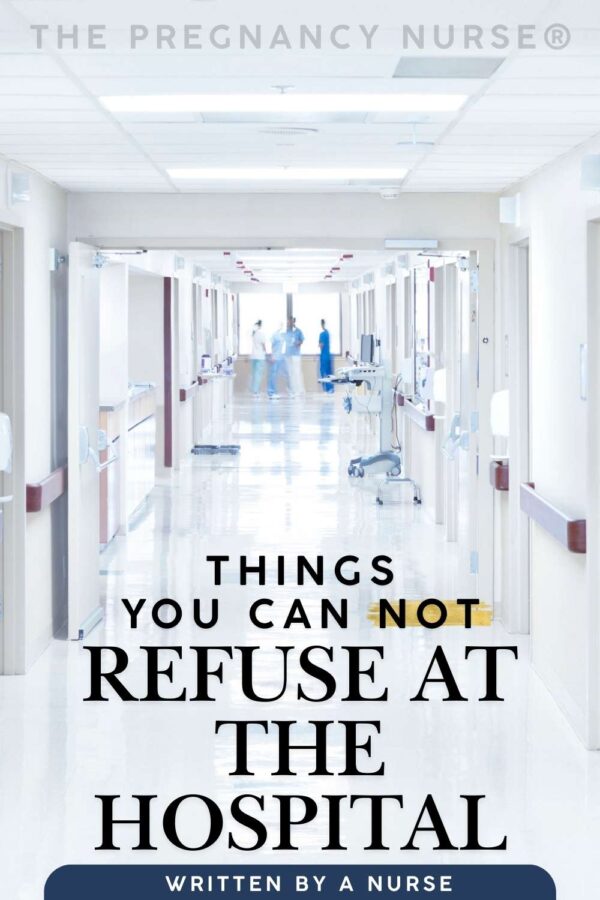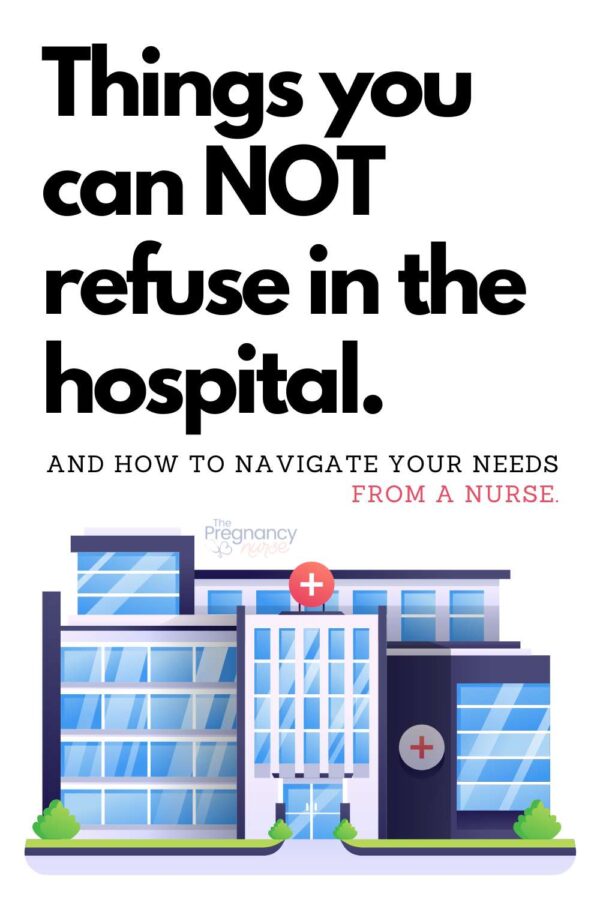📣 YOU are clearly getting prepared for pregnancy, birth & beyond — but do you wish your partner was more involved (looking for a teammate rather than just a cheerleader)? Couples love THIS! 💛🧡💚
Today we’re sharing what hospital policies you can not say no to (or ones that have some pretty serious consequences). I hear a lot that “hospital policy” isn’t law, but there are some that can not be side-stepped and I wanted to get those out of the way.

As a note, there is a LOT you can refuse during labor — these ones are just not part of those.
FYI hospital POLICIES are things that are written down, and often OK’d upon admission. You will find that these are very basic things as you keep reading. Most often people are refusing orders not policies. Something to be aware of (because some people seem to use the interchangeably).
On the other side there is a LOT you actually can choose that people don’t even know about it. Come join me in my quick birth plan prep series where I share some of the most common choices you’ll have:
I also have a video where I go through this if you want to take a break from reading:
Paying
This one shouldn’t come as a shock — but when you go to the hospital are you are assuming responsibility of paying for the care you receive there (especially in the USA).
Even if you arrive and are unable to “sign” for care it is still assumed you will pay for it.
Fun Fact: They should admit you to the hospital before you sign all that paperwork if you’re considered unstable — aka in labor or having issues with your pregnancy. They CAN make you sign it for a scheduled event like a cesarean or an induction. These are super handy things to know and I share more tips like this in here.
Because hospitals can’t refuse to care for you, on the other side of the coin you are mandated to pay for that care.
Want to know more about insurance tips — check out these posts:
- Are Childbirth Classes Covered by Health Insurance?
- Appendicitis Tales: Inside the Mind of a Nurse Turned Patient
- What do People Wish They Had Known About Before Birth?
Hospital Chooses Visitors
The hospital does have to treat you — meaning we can get a HUGE fine if we were to boot you out to the curb before you are stable. However, we do not have to allow visitors if we have a reason to refuse them in your room.
Now, most often this does not happen — however if a visitor exhibits any violence towards staff members or talks about violence they will be removed from the premise and not allowed back.
Hospitals do have security and they will remove visitors and it is not within your rights to have them there.
This can also include children if they aren’t properly taken care of. Our other option would be to call protective services for the children and have them removed to foster care. I know this sounds harsh, but I’m just telling you the reality….

Items Allowed
There are items that the hospital may not allow in the hospital. This mostly includes weapons and illicit drugs, but some hospitals may refuse other things.
I’ve seen people online encouraging you to bring your own birthing tub and a hospital can refuse to have that in the room. Most often these things are about patient safety (think weight limits for the floors or the possibility of leaks over other important patient care areas).
Want to know more hospital tips — check out these posts:
- What a Birth Plan Can ACTUALLY Do For Your Birth?
- Inducing Labor at 39 Weeks: Pros and Cons
- Advocating For Yourself in Labor
- 5 Things You CAN Control in Labor (mostly)
- My #1 Tip for Hospital Birth
Informed Consent
You can’t refuse to get consent at the hospital.
That means we have to tell you the:
- Risks
- Benefits
- Alternatives
of what we are recommending or requesting. That isn’t to say that you don’t have to listen, but that is literally what we are there for. We can be held liable if we do not share those.
HIPAA
You can’t request to give information to someone without going through the proper channels.
Aka, “can you let my mom know if she calls how I’m doing.” We can’t do that without the proper paperwork. Most often they need an identifying code and often the nurses may actually be too busy to give out updates on the phone frequently.
So, you can give us people who are allowed to hear your healthcare information — but you can’t sidestep giving us the proper consents to be able to do that.
In case you didn’t know, HIPAA is a law in the US that prevents us from giving out your health information without your consent.
Get Another Caregiver
I see a lot of people acting online like you can easily get a new nurse if you don’t like the one treating you.
You can always ask for a new nurse. That is 100% true, but often nurse staffing is really tight, and we may not have a nurse that we can switch your nurse with right then.
This same thing goes for a doctor — every patient must have a doctor who is overseeing them, and a nurse to be a patient at the hospital. Both of those have to be assigned and often we can’t change them as quickly as you’d hope.
If you come to the hospital without a doctor one will be assigned to you (called the on-call doctor — or a hospitalist) but there has to be both a doctor and a nurse assigned to you at all times.
I have a whole post on what to do if you don’t like your nurse that explains what I’d do if I didn’t like my nurse.
I will say most often it’s a communication issue — and learning to communicate properly makes a HUGE difference:
Charting
You can’t refuse charting. I mean, I wish I could refuse charting on behalf of the over-burdened nurses out there, but charting is going to happen when we are treating you as a patient in the hospital.
You can request to see the charting after it is done — everyone health care system has their own way to get access to that.

So, what CAN you do?
Let’s say one of these things is rubbing you the wrong way — what CAN you do about it?
You can ask to speak to a patient’s rights advocate (or something along those lines — every hospital is different). They can help you understand what you CAN do and can’t do in a situation — and can sometimes slow things down and help the hospital accommodate you as best they can.
You can leave of your own wishes. The hospital can never prevent you from leaving. Most places it’s called “discharged AMA” (against medical advice) and you can choose to do it at any time.
I often hear nurses say that your insurance may not pay if you leave AMA but I’ve actually never actually heard/seen that happen — so take that with a grain of salt.
Decide what you CAN refuse that gets to the root of the problem. Maybe they aren’t feeding you and that is what you really want and it’s making you want to leave — tell them the actual problem and see what can be arranged beyond that.
That being said, the nurse can’t do anything that isn’t a doctor’s order.
- She can’t give you medications they haven’t ordered
- They can’t assist you in doing something they haven’t ordered (aka, if you’re on bedrest they can’t help you get up)
- They can’t feed you something that isn’t ordered
You can ALWAYS make the choices to do things on your own, but you’d have to bring them on your own or have help from a family member.
Want to know more about refusing things — check out these posts:
- Can You Refuse a Urinary Catheter During Labor
- Can I Refuse an IV During Labor?
- Can I Refuse Cervical Checks in Labor? Declining cervix exams in pregnancy.
- Things You Can Refuse During Labor
- Routine Things in Labor You Might Want To Refuse with Dr. Fran
What to consider before refusing things in the hospital:
Refusing things in the hospital seems to be the way that some “natural birth advocates” seem to “stick to the hospital man” — and while that’s nice, let’s talk about some things to consider first:
Why is that a policy or ordered?
It’s so important, before blithely refusing something, to think about why something has been ordered for you, or it’s a standard of care in the hospital.
You may be ultimately refusing lifesaving treatments.
What types of consequences could it have?
Sometimes the consequences is of very small value — aka, you eat some trail mix in labor, things go fine and you’re fine. OR, you have an emergency cesarean and you aspirate an almond bit into your lungs. That could have serious consequences (although also very rare, in most cases).
Sometimes the consequence has far-reaching effects. For instance, if you refuse a urinary catheter before a cesarean section, we may not be able to do the surgery. First and foremost we aim to not do harm to you, and nicking your bladder before surgery could very much do harm. Similar if you were to refuse an IV before a cesarean — they just wouldn’t do the surgery. There are some specific things, especially with surgery, that HAVE to be in place in order to do it.
The consequence could end-up being born by your baby is you refuse an urgent cesarean. Or, the baby could be born just fine — you never know.
What is best for you?
You just have to weigh all the pro’s and con’s in a situation and decide what is right for you.
No one else can do that — not your partner, not the hospital — that’s something that you need to do.
Most of all I hope that you have a provider that you feel safe talking through your options, your values align and you’re willing to trust them with your life should it come to that. Although rare, it can come to that and I hope you feel that way towards them.
Also, keep in mind the difference between hospital policy (aka, you have to pay) vs doctor’s orders. Those are two different things, and while a doctor’s order can sometimes override hospital policy, some policies override what a doctor wants.
Hospitals are tricky. Understanding how they work and your rights as a patient can be hard — especially if you just learn about them when you get to the hospital. Learning how to navigate the entire hospital system will have huge dividends that will pay-off big time.
While a lot of people think that a birth class is just learning to navigate pain, I would propose that learning to navigate healthcare is just as much (if not more) important. Learning to get information from your healthcare team and then make choices on your own can feel difficult, but learning from an expert can help a lot!
The Online Prenatal Class for Couples will do just that:
- Understand 3rd trimester testing, so you understand how the results impact future care
- Understand what happens at birth, why and what choices you have
- Understand how to get the most out of your postpartum stay in the hospital (because so many people waste that time).
It’s available on-demand and only takes a few hours, you can join right here.
Want to do a vibe check before diving into the whole thing with me? — check out my free labor pro tips. It’s your first step toward getting in the driver’s seat of your birth.







 What is Pushing at Delivery?
What is Pushing at Delivery?
